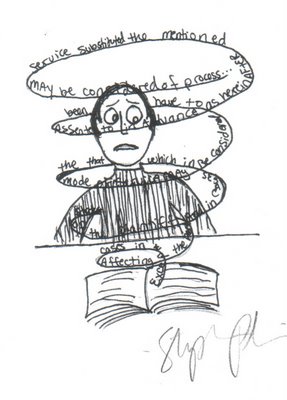Week Two, Part 1 - Amazingly Dense

Monday is Labor Day, and I’m up at 5:00 a.m. to work some more on Civil Procedure. Professor Bauer’s assignment sounded simple enough: read the first chapter of the casebook and brief Pennoyer v. Neff. I’ve already spent an afternoon on it, yet made minimal progress.
The casebook author, Stephen Yeazell, writes that “at this point in your legal studies you are still an outsider.”
Thanks! As if I hadn’t noticed.
The text is full of words I’ve heard, but feel no connection to – complaint, joinder, summary judgment. In the margin I define the ones that are most unfamiliar. “Adjudication” - “the determination of a controversy and a pronouncement of judgment based on evidence.”
I find Yeazell’s phrasing more interesting than the content: “absence of compulsion” and “the elaborate game called litigation.” Procedure is the “etiquette of ritualized battle.”
By 8:00 a.m. I’m through the introductory material. Yeazell introduces Pennoyer as “a case whose deceptively simple facts spawned a truly splendid doctrinal elaboration.” Hmm.
I read on. It’s about a lawyer who sued his client for unpaid legal fees! I laugh out loud. If law school is “coming to know the ways of lawyers,” to borrow a phrase from Midnight in the Garden of Good and Evil, then the lesson from Pennoyer must be fundamental.
I work through the case. The facts are manageable, but the issue and reasoning elude me. In the last half of the opinion, the sentences are amazingly dense. One reads:
“Except in cases affecting the personal status of the plaintiff, and cases in which that mode of service may be considered to have been assented to in advance, as hereinafter mentioned, the substituted service of process by publication, allowed by the law of Oregon and by similar laws in other States, where actions are brought against non-residents, is effectual only where, in connection with process against the person for commencing the action, property in the State is brought under the control of the court, and subjected to its disposition by process adopted to that purpose, or where the judgment is sought as a means of reaching such property or nature of a proceeding in rem.”
Yeah, well, whatever.
I’ve never been stumped like this. If anything, reading has always been my trump card. I was an English major in college, then a teacher. My GRE Verbal score was “truly splendid,” to quote Yeazell. In the “elaborate game” called the Law School Admisssions Test, I didn’t miss a question on Reading Comprehension. Yet, Pennoyer is more or less beyond me.
I put away my half-baked brief and drive up to Notre Dame Law School, wondering if my academic skills are going to be adequate.
* * *

0 Comments:
Post a Comment
<< Home